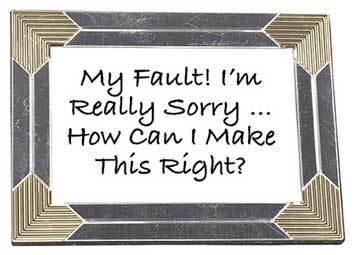My Bad! What Leaders Say Can Hurt Them!

My bad! This phrase consists of only five letters — two syllables — and yet, it communicates volumes. This slippery phrase is a popular way of admitting a mistake, and apologizing for that mistake at the same time — without offering any apology at all. You’ve got to admire the efficiency of it!
So what on earth could be wrong with it? Why should Extraordinary Leaders avoid it like the plague? This phrase is really a cop out for those who are loath to offer genuine apologies — or take accountability and responsibility for their mistakes. Think about it. Would you want your surgeon — or even your hair stylist — to say “My bad!” while they are working on you? What about the person who packed your parachute?
The problem is that the phrase minimizes any remorse or regret surrounding the incident. A flippant “My bad” sloughs it off like brushing lint off your sleeve. The recipient, while perhaps grateful to you for taking responsibility, does not feel as it the issue has been taken seriously.
Leaders who use this phrase depreciate their people, and diminish their own accountability and value. Overuse of phrases like this will lead to active disengagement among your employees in no time flat … leaving you saying , “Oops, my bad!”
What Leaders Can Do
Like many slang terms, this phrase does hold a kernel of value. It allows a person to own up to a mistake without beating themselves up over it. However, as a leader striving to be extraordinary, we urge you to remove this phrase from your vocabulary, and encourage your employee to do the same. If you have made a mistake that affects others, and your only response is to flippantly reassert the goodness of your intent with an offhand “My bad,” you’re demonstrating that you don’t care about the effects of your words or actions— which is to say, you may be demonstrating an utter lack of accountability as well. Because we feel this is such an important skill for leaders to practice, we are dedicating a bit more space to share some useful tips to help you handle mistakes as an extraordinary leader:
• Own up to your own mistakes. We saw a great quote that was unattributed (so we can’t give credit, except to that famous Anonymous author): “A real leader faces the music, even when he/she doesn’t like the tune.” Being willing to acknowledge your own errors models that it’s okay for your employees to do so too.
• Let people know where it’s appropriate to make a mistake, and where mistakes cannot be tolerated. There is a misconception out there that mistakes mean something is happening, and everyone should be allowed to be free to make mistakes. While this is one of those ideas that sounds good, it’s also important to realize there are times when mistakes are not acceptable. Folks need to know where those areas are. This frees them up to experiment and creatively attempt new ideas in reasonable and suitable situations.
• Teach the difference between forgiveness and accountability, and practice them together. You can definitely forgive a person for a mistake they have made—no issues with that; however, individuals must also be held accountable for the consequences of the mistake.
• Be sure everyone learns from mistakes that are made. Regardless of who is responsible for the mistake (you, another employee, an entire team, or even your customer/client), the most important thing to do is learn from it, so you can avoid it in the future. One of the most ridiculous things we heard one manager say to his employee after the employee made a very public mistake was: “This better not ever happen again!” How unfortunate! Of course no one wants it to happen again, most of all the employee who has been ridiculed in front of clients and peers. An extraordinary leader knows how to bring the team together and ask the question, “How can we prevent this from happening again?” Often this kind of discussion can help identify root causes that underlie more than one knotty issue.
• Create an environment where people feel safe admitting a mistake. Fear of retribution is the number one reason we see that prevents mistakes from being identified and fixed. Once folks realize they can admit a mistake without being pushed off the plank, the level of active engagement among employees will zoom. And mistakes that are identified early are much more easily fixed!
• Learn how to apologize with sincerity and reflection. The same strategies for giving good feedback apply to apologies: Timeliness, specificity, sincerity, and recovery. It’s important to admit your error, acknowledge the inconvenience or difficulty it created, and focus on how you can make it right.
• And never, ever say: “Whoops, my bad.”
How to Reframe It:

If you enjoyed this article, check out our book: Seriously? 25 Cringe-Worthy Phrases Leaders Use That Rob Them of Their Credibility … and How to Retool Them.

